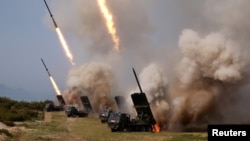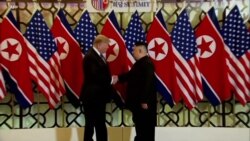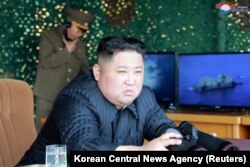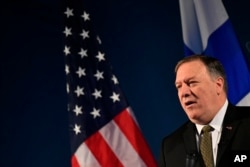By conducting what appears to be its first ballistic missile test in a year-and-a-half, North Korea has presented an obvious challenge to U.S. President Donald Trump, who has refused to relax sanctions on Pyongyang.
But the launch also seems intended to pressure South Korean President Moon Jae-in, who has increasingly become the target of North Korea’s outrage as nuclear talks with the U.S. falter.
VIDEO - US, South Korea Shrug Off North Korean Missile Test
In a test personally overseen by Kim Jong Un, North Korea on Saturday fired a new short-range ballistic missile, analysts said, along with several other projectiles from a multiple rocket launcher, into the sea off its east coast.
Though the launch appears to violate U.N. Security Council resolutions that ban North Korean ballistic missile activity, Trump and other U.S. officials quickly downplayed the importance of the test, pointing out the North did not violate its self-imposed suspension of tests of intercontinental ballistic missiles.
But the launch is tricky for Moon, who wants to continue his signature policy of engagement with North Korea, but risks being seen as weak in the face of continuing North Korean provocations.
North Korea blames Moon for not implementing aspects of the inter-Korean agreements reached during his three summits with Kim over the past year. U.S. and international sanctions have prevented Moon from following through on many parts of the pacts.
North still upset about exercises
Pyongyang is also upset Seoul has gone ahead with joint military exercises with Washington, even though the drills have been scaled back to help facilitate diplomacy with the North.
According to long-time North Korea scholar Robert Carlin, the North Korean test was likely the “corresponding measure” Pyongyang had warned of late last month in a statement blasting Seoul for continuing the military exercises.
In that statement, Kim criticized the scaled-back U.S.-South Korean military exercises as “disguised persistent hostile acts...in other codenames, though they were agreed to be stopped.”
While North and South Korea agreed last April to stop “all hostile acts” against each other and eliminate the “danger of war,” the two sides never signed a statement agreeing to completely halt military exercises, and drills have continued on both sides.
Despite the drawdown of U.S.-South Korea exercises, U.S. military officials have said they observed no similar scaling back of regular North Korean military drills.
Firmer response from Seoul?
For its part, South Korea’s presidential office said it is “very concerned” the North Korean missile test violates the spirit of the inter-Korean agreements, and called on Pyongyang to stop acts that raise military tensions.
Seoul’s response stands in contrast to the softer approach of the Trump administration, which has not yet publicly criticized the North Korean launch.
In a Saturday tweet, Trump said he believes Kim “fully realizes the great economic potential of North Korea and will do nothing to interfere or end it. He also knows that I am with him and does not want to break his promise with me.”
U.S. Secretary of State Mike Pompeo also did not criticize the North Korean missile test during three separate television interviews on Sunday morning.
“At no point was there ever any international boundary crossed,” Pompeo told ABC’s This Week. “That is, they landed in the water east of North Korea and didn’t present a threat to the United States or to South Korea or Japan.”
Pompeo said the U.S. is still analyzing the data and considering a response, but that he is confident the launch did not involve intercontinental ballistic missiles and therefore did not violate Kim’s moratorium on missile tests.
“The moratorium was focused, very focused, on intercontinental missile systems, the ones that threaten the United States, for sure,” Pompeo told Fox News Sunday.
Diverging views among, Tokyo, Washington, Seoul?
To some analysts, that suggests the Trump administration is willing to tolerate any North Korean test short of an ICBM, a stance that could unnerve U.S. allies in Northeast Asia.
“Pompeo's response made no sense as a strategy and undercut our allies in the region,” said Mintaro Oba, a former State Department diplomat focused on East Asia. “He effectively defended the legitimacy of shorter-range North Korean launches.”
“Pompeo could have made all of the right points while also saying that the United States is ready and willing to talk with North Korea at any time, but that it's critical for Pyongyang to avoid escalating tensions and undermining the diplomatic process,” Oba added.
While the U.S. mainland might only be reached by North Korea’s intercontinental ballistic missiles, South Korea and Japan are within range of the North’s short and medium range arsenal.
“The South Koreans aren’t on board with Pompeo’s ‘test anything you want as long as it can’t reach me’ standard,” Jeffrey Lewis, a North Korea watcher and Director of the East Asia Nonproliferation Program at the Middlebury Institute, said on Twitter.
The U.S. and South Korea have repeatedly insisted they are in broad agreement on North Korea policy, and have attempted to downplay any reported differences of opinion. When disagreements have arisen, it is usually Seoul that is taking is the more conciliatory approach than Washington -- making this latest situation a role reversal, Oba said.
Moon is under considerable domestic, as well as international pressure, on North Korea. An increasing number of conservative opposition South Koreans oppose his outreach to the North, viewing it as naive and unsuccessful.
In the days following his first meeting with Kim, Moon’s public approval rating was more than 80 percent. It has now slipped to the mid-40s. Adding to Moon’s woes, South Korea’s economy unexpectedly contracted in the first quarter of 2019.
Moon, whose presidential term isn’t up until 2022, still has time to deliver. He remains optimistic about engagement with the North, saying last month he would hold a fourth summit with Kim “any time, any place.”














